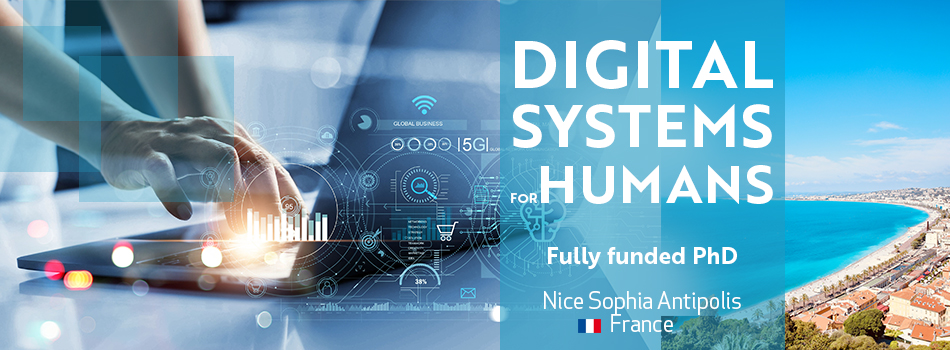Page under construction
2026 campaign will open soon.
In 2026, DS4H Graduate school will be awarding 12 doctoral projects:
- Two of them financed by the DS4H Graduate school and focused on "Digital and Environment" theme on the one hand and "Multidisciplinarity" theme on the other hand.
- Nine of them financed by the Doctoral school in Information and Communication Technologies (ED STIC).
- The last one delegated by the QuantAzur Institute to DS4H Graduate school on applied quantum technologies (quantum computing, quantum simulation, quantum communication or quantum metrology and sensing), for which transdisciplinary projects involving several laboratories on the site will be particularly appreciated.
- 2026 Campaign Calendar
-
- March 3: Start of thesis topics submission and start of applications
- April 30 (23h59): Deadline for submission of thesis topics
- May 3 (23h59): Deadline for student applications to thesis supervisors
- May 7 (23h59): Final choice of student supported by each thesis supervisor
- Between May 8 and the end of May: Auditions of the students and their potential thesis supervisors for QuantAzur grant.
- June 16 and June 18: Auditions of the other students and potential thesis supervisors.
- End of June : Final laureates decision
- Why should you apply as a PhD candidate?
-
As a doctoral student at Université Côte d'Azur, you will be provided with a very high-quality hosting environment:
- Attractive salary: doctoral candidates will get a net salary of ~2045 € as monthly living allowance (annual gross ~40,7 k€ - please notice this amount may change according to regulatory changes that may occur between now and the beginning of the contract and throughout the contract). An additional allowance of 10 K€ will be allocated by DS4H Graduate school to selected subjects submitted before 2025 April, 13th (23h59).
- Excellent research environment including international-renowned laboratories with long-standing practices for leading doctoral projects and the lab/industry cross-fertilization in Nice-Sophia Antipolis, the fast-paced European largest technopark.
- Interdisciplinary research options as cross-domain vision lies at the heart of the Digital Systems for Humans Graduate school project.
- International networking: researchers from dozens of different nationalities work together in our laboratories and almost 70% of the PhD students are foreigners. Moreover, Université Côte d'Azur is co-founder of the UlyssEUs European University Alliance and a strategic partner of the University Laval, Canada. Read more about Université Côte d'Azur worldwide...
- PhD mobility support program: DocWalker
- Additional training modules to boost your career (minors, student supervision training, scientific mediation, etc.).
- Specific PhD candidates individual support from Université Côte d'Azur (housing, administrative procedures, child-care solutions, newcomers meetups...).
- Active student life with ADAMS Association and ADSTIC: academic and unifying events, after school peer learning meetings, parties…
- ... and the world-envied French Riviera quality of life!
- How to apply?
-
- As a PhD candidate
-
Application deadline: 2026 May 3 (23h59)
To apply:
- Simply click on the topic of your choice in the list below and click on the "Candidater/Apply" button at the bottom of the topic page
- You have to provide:
- An up-to-date CV
- A cover letter
- Transcripts for at least the Master 1 and the first semester of the Master 2 (or equivalent), including, if known, the ranking within the class or the chosen specialization
- If the Master's degree is in progress: a scientific description of the ongoing research internship
- Otherwise: the Master's degree diploma, a complete transcript for the M2 or equivalent, and a summary in French or English of the thesis (the thesis itself is not required)
- Optionally: additional letters of recommendation or any document that can support the quality of the application.
- In any case, send an e-mail to the PhD supervisor to inform him or her that you apply.
- The director will then select the student (s)he will support, prepare the application file and the audition with him/her, and submit the application file to DS4H Graduate school.
- If you are selected, you will have to register to the Doctoral school of Information and Communication Sciences and Technologies (ED STIC).
- As a PhD supervisor
-
How to submit a thesis subject?
From March 3 to April 30, 2026 (23h59)
- To submit a thesis subject, you must be a member of a laboratory associated with DS4H Graduate school and an HDR registered with ED STIC.
- To submit your subject in the correct format, please refer to the e-mail from your laboratory or doctoral school Director.
How to submit a PhD candidate application?
Application deadline: 2026 May 7 (23h59)
PhD supervisors apply for DS4H fundings after having selected a PhD candidate on a PhD given topic.
Folders submitted by the potential PhD supervisors should contain :
- A description of the chosen PhD subject
- The candidate’s CV
- Cover letter from the candidate
- If the Master is still in progress: the transcripts of at least Master 1 and the first semester of Master 2 (or equivalent) with, if available, the rankings among the master, and a scientific description of the current research internship
- Else: the Master diploma, a complete transcript of the Master 2 or equivalent, and the dissertation with at least a summary in French or English
- A letter of the potential PhD supervisor with commitment to supervise the candidate, a description of the knowledge (s)he has of the candidate, and why (s)he chose this candidate on this subject
- Optionally : recommendation letters and any document likely to support the quality of the triplet
- Selection Process
-
The DS4H jury evaluates and ranks candidate/subject/supervision triplets, taking into account the thematic priorities and scientific scope of DS4H Graduate school.It assigns rapporteurs who organise a audition of the student in the presence of the potential supervisor (videoconferencing allowed).
The jury evaluates and ranks the applications, i.e. the student/subject/supervisor triplets, on the basis of the following criteria :- the quality of the student’s academic background and its relevance with respect to the proposed subject and doctoral supervision
- the scientific maturity of the student and the potential impact of the PhD at the end of the 3 years
- the smooth functioning of the triplet, assessable in particular through the joint preparation of the audition by the student and his/her potential supervisor
- the relevance of the topic to the thematic priorities, and to the scientific scope of DS4H Graduate school.
The main purpose of these criteria is to assess the potential for success and outreach of the PhD at the end of the three-year doctorate, therefore the quality of the student’s academic record is of significant importance.
- What if the PhD of your dream is not on this list? or if you want to apply after the official closing of the campaign?
-
You can still contact your doctoral school directly to identify open thesis subjects and fundings:
- Doctoral school of Information and Communication Sciences and Technologies (ED STIC)
- Doctoral School of Humanities and Social Sciences (ED DESPEG)
- Doctoral School of Societies, Humanities, Arts and Literature (ED SHAL)
You can also identify the researcher of DS4H Graduate school's partner laboratories best matching your subject of interest and ask him/her if he/she would be willing to supervise you and if he/she can submit a specific topic for you. - Former Laureates
-
Since 2019, DS4H Graduate school has been awarding research grants targeting thematic priorities:
- Digital and Social Sciences
- Digital and the Environment
- Artificial Intelligence, in partnership with the 3IA Côte d’Azur
- And more recently, applied quantum technologies (quantum computing, quantum simulation, quantum communication or quantum metrologies and sensing), in partnership with QuantEdu-France through QuantAzur Institute
| THESIS SCIENTIFIC FIELD / Title | Host Laboratory |
| COMPUTER SCIENCE | |
| CONTROL, OPTIMIZATION, PROSPECTIVE | |
| AUTOMATIC SIGNAL AND IMAGE PROCESSING | |
| ELECTRONICS | |



